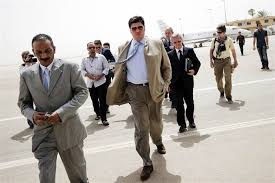Jumping on the NATO Bandwagon
- Editor
- Jun 15, 2011
- 2 min read
By Miriam Awadallah, Transatlantic Community Analyst

Russian President Dmitry Medvedev’s decision to send his Presidential envoy, Mikhail Margelov, to Libya in order to mediate talks between the rebel Transitional National Council (TNC) and Moammar Gadhafi’s government could herald a new role for Moscow in the Middle East and North Africa (MENA). The move raises questions about Russia’s motives and intentions.
The main question is whether or not these talks will end up being effective. Although Russia has condemned NATO air strikes in Libya, it will be difficult for it to mediate talks between the TNC and Gadhafi now that it has joined other countries in calling for Gadhafi to step down. It’s unlikely that Tripoli will take Russian efforts to mediate talks between the two camps seriously.
Considering that Russia decided to abstain from voting on the United Nations Security Council resolution that authorized military intervention in Libya, why is it suddenly interested in playing a bigger role in resolving the conflict? It appears that it’s seeking a piece of the Libyan pie in the post-Gadhafi era.
Russia has invested billions in Libya through various energy and arms contracts and does not want to lose its influence in the North African nation. Nor does it want to lose the opportunity to become a bigger player in the MENA region in general. Other nations in the tumultuous region may call on Moscow to mediate talks if it does so successfully in Libya.
But a number of European and Middle Eastern nations have already recognized the TNC as the legitimate representatives of the Libyan people, bolstering international support for the rebels’ resistance against Gadhafi’s government. With all the increased international pressure for the removal of Gadhafi, it doesn’t seem that Russian involvement will make a substantial difference.

Comments